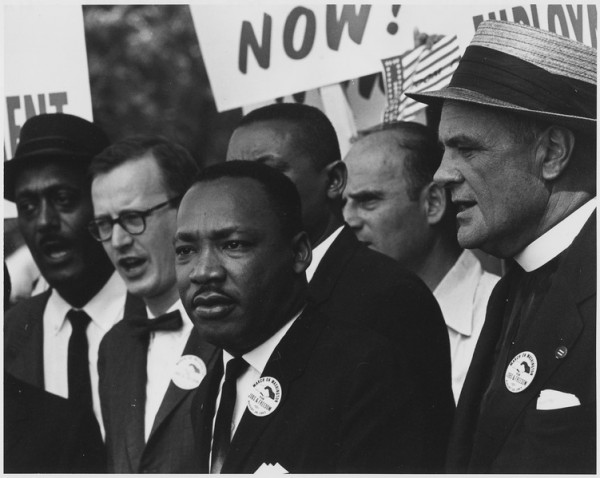Pressenza publishes, with permission, this excellent analysis by the controversial anti-nuclear campaign Wildfire>_ which has been stirring up trouble with humour and satire in nuclear forums since 2013.
At the closing session of the NPT review conference on 22 May, South Africa described the NPT regime as a form of “nuclear apartheid”. This certainly captures the idea of a privileged minority unjustly imposing its will on a disenfranchised majority. But in many ways, a better analogy is that of the struggle for civil rights in the United States in the 1950s and 60s.
As Martin Luther King eloquently described in his celebrated “I have a dream” speech in 1963, the US Constitution and Declaration of Independence were a “promissory note” on which the US had defaulted in respect of black Americans. The rights and freedoms supposedly guaranteed to all were, through Jim Crow laws and myriad informal means, routinely denied to black citizens. For the US Government at the time, and for many Americans, this was a situation that needed to be remedied – eventually, at some undetermined point in the future, when conditions were “right”, through a gradual, step-by-step process, being careful to maintain “order”. Of course, this never happened. Only when the civil rights movement started to take direct action (the Montgomery Bus Boycott, the Freedom Rides, and many other non-violent, imaginative and extraordinarily courageous protests) did things start to change.
Similarly, the NPT is a “promissory note”, an unequivocal commitment by the nuclear-armed states to disarm, on which they have defaulted. And similarly, non-nuclear-weapon states are enjoined to be patient; the situation will be remedied, at some undetermined point in the future, when conditions are “right”, through a gradual, step-by-step process, being careful to maintain “strategic stability”. Of course, this will never happen.
And now that the humanitarian consequences initiative has raised the prospect of non-nuclear-weapon states taking matters into their own hands, we hear from weasel states a stream of admonitions and entreaties startlingly similar to those that King heard from those he called “white moderates”. In his Letter from a Birmingham Jail, King wrote, “the Negro’s great stumbling block in his stride toward freedom is not the White Citizen’s Counciler or the Ku Klux Klanner, but the white moderate, who is more devoted to ‘order’ than to justice; who prefers a negative peace which is the absence of tension to a positive peace which is the presence of justice; who constantly says: ‘I agree with you in the goal you seek, but I cannot agree with your methods of direct action’ … who lives by a mythical concept of time and who constantly advises the Negro to wait for a ‘more convenient season’.” From the weasels we hear calls to “engage, not enrage” the nuclear-armed states, that a ban treaty would be “confrontational”, a “provocation” or “disruption” that would jeopardise further steps towards disarmament, that there is no substitute for gradual, incremental progress – even as none is happening.
King was not swayed by such arguments; as he wrote: “We know through painful experience that freedom is never voluntarily given by the oppressor; it must be demanded by the oppressed.” Non-nuclear-weapon states – and especially those that have joined the Humanitarian Pledge – should heed his words. They should recognize “the fierce urgency of now. This is no time to engage in the luxury of cooling off or to take the tranquilizing drug of gradualism”.
If you have a dream that one day nuclear weapons will be prohibited and eliminated, then you need to rise up and act. Somebody has to take the first step, to refuse to give up their seat on the bus. So which country will be the Rosa Parks of nuclear disarmament?










